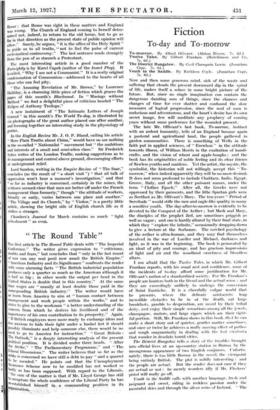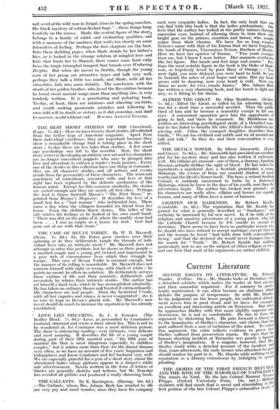Fiction
To-day and To-morrow
Now and then some generous mind, sick of the waste and suffering that clouds the present downward dip in the spiral of life, makes itself a solace in some bright picture of the future. But, since no single imagination can contain the • dangerous dazzling sum of things, since the chances and changes of time for ever shatter and confound the slow measures of logical progression, since the soul of man is audacious and adventurous, and the heart's desire has its own secret image, few will meditate any prophecy of coming years without some preference for the wounded present.
The late Mr. Offivant's last book, To-morrow, instinct with an ardent humanity, tells of an England become again
a pastoral and agricultural land, the people gathered in garden communities. There is something of Wells in the faith put in applied sciences, of " Erewhon " in the attitude towards illness, of William Morris in the exaltation of handi- crafts, and the vision of wheat and apple-boughs ; and the book has its originalities of noble feeling and its clear friezes of flawless youths and maidens. Yet the artist, the mystic, the symbolist, the historian will not willingly accept this "To- morrow," when indeed apparently they will be no more desired.
It does not seem profound to include Chaldaea, India, Egypt, Greece, Italy, and all the other puissant names, under the term "Clothes Epoch." After all, the Greeks were not oppressed by their garments, and the lithe Spartan girls were as fleetfoot as Mr. 011ivant's Mary. The ten-years "Period of Servitude " would stifle the rare and eagle-like quality in many
a sensitive-youth. 'The day-after-to-morrow is evidently to be
devoted to the Conquest of the Aether ; but Mark and Mary, the disciples of the prophet Zed, are sometimes priggish as well as vague ; and one is hardly allured by their final State, in which they "explore the infinite," occasionally dropping down to give a lecture at the Sorbonne. The rarefied psychology of the aether is ultra-human, and they may find themselves involved in the war of Lucifer and Michael, darkness and light, as it was in the beginning. The book is permeated by an ideal of pity and courage, and has gracious impressions of light and air and the woodland sweetness of bloodless altars.
I am afraid that the Twelve Tales, in which Mr. Gilbert Frankau reports, with his usual zest and confidence, some of
the incidents of to-day afford some justification for Mr.
011ivant's notion of a standardized society. For Mr. Frankau-s people are hunters both in the literal and the actual sense ; and
'they are exceedingly unlikely to undergo the conversion of Saint Eustache. It is a cheerfully vulgar world that he presents, where the delicate aristocrats leap incredible obstacles to be in at the death, eat large breakfasts, gamble to desperation, are saved by their tribal deity, and enjoy their simple sensations among all the jewels,
champagne, motors, and large cigars which are their right- ful portion. Still, Mr. Frankau shows in this book, that he eau make a short story out of quieter, gentler matter sometimes, and once or twice he achieves a really moving effect of pathos and rough magnanimity in dealing with the lost creatures
that wander in desolate torrid cities. •
The District Bungalow tells a story of the troubles brought into official lives at an up-country station in Ilumia by the incongruous appearance of two English conjurors. Unfortu: natelv, there is too little Burma in the novel, the viewpoint being entirely British. The plot is mildly interesting : and the people are actual. But the reader does not mire if they are actual or not : he merely wonders idly if Mr. Fleckers' pistol will really go off. Youth in the Saddle calls with another language, fresh and poignant and sweet, riding in reckless passion under the mournful skies and through the silver rains of Inclend. " The Salt scent of the wild rose in Erigal, irises in the spring marches, the black mystery of cotton-flecked bogs "—these things harp tenderly on the senses. Shule, the central figure of the story, belongs to a family of subtle and enchanting qualities, sad with a memory of the madness that waits too closely on some intensities of feeling. Perhaps the first chapters are the best. Into these darkling pages, when Shute stands by her father's bier, or is locked in the strange relation of mingled love and hate that binds her to Shanad, there comes some faint eddy from the tragic triumphal tempest that broods over Wuthering .Heights. But when she moves to Dublin, though the young men of her group are attractive types and talk very well, perhaps they talk a little too much, and Shule, with all her sincerities, falls into some dubiety. The conclusion, with the death of her golden brother, who loved the Revolution because he loved sweet ancient songs more than anything else, is very tenderly written. It is a penetrating and pulsating book. To-day, at least, there are rainbows and wheeling sea-birds, and youth making passionate mistakes and following its own wild will to death or victory, as it did yesterday, and shall to-morrow, world without end. RACHEL ANNAND TAYLOR.































































 Previous page
Previous page